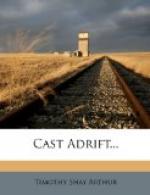She fell forward upon her bed, kneeling, her face hidden among the pillows, trembling and sobbing.
“Edith! Edith!” came the agitated voice of her father from without. She rose quickly, and opening the door, saw his pale, convulsed countenance.
“Quick! quick! Your mother!” and Mr. Dinneford turned and ran down stairs, she following. On reaching the dining-room, Edith found her mother lying on a sofa, with the servants about her in great excitement. Better than any one did she comprehend what she saw.
“Dead,” fell almost coldly from her lips.
“I have sent for Dr. Radcliffe. It may only be a fainting fit,” answered Mr. Dinneford.
Edith stood a little way off from her mother, as if held from personal contact by an invisible barrier, and looked upon her ashen face without any sign of emotion.
“Dead, and better so,” she said, in an undertone heard only by her father.
“My child! don’t, don’t!” exclaimed Mr. Dinneford in a deprecating whisper.
“Dead, and better so,” she repeated, firmly.
While the servants chafed the hands and feet of Mrs. Dinneford, and did what they could in their confused way to bring her back to life, Edith stood a little way off, apparently undisturbed by what she saw, and not once touching her mother’s body or offering a suggestion to the bewildered attendants.
When Dr. Radcliffe came and looked at Mrs. Dinneford, all saw by his countenance that he believed her dead. A careful examination proved the truth of his first impression. She was done with life in this world.
As to the cause of her death, the doctor, gathering what he could from her husband, pronounced it heart disease. The story told outside was this—so the doctor gave it, and so it was understood: Mrs. Dinneford was sitting at the table when her head was seen to sink forward, and before any one could get to her she was dead. It was not so stated to him by either Mr. Dinneford or Edith, but he was a prudent man, and careful of the good fame of his patients. Family affairs he held as sacred trusts. We’ll he knew that there had been a tragedy in this home—a tragedy for which he was in part, he feared, responsible; and he did not care to look into it too closely. But of all that was involved in this tragedy he really knew little. Social gossip had its guesses at the truth, often not very remote, and he was familiar with these, believing little or much as it suited him.
It is not surprising that Edith’s father, on seeing the letter of Lloyd Freeling, echoed his daughter’s words, “Better so!”
Not a tear was shed on the grave of Mrs. Dinneford. Husband and daughter saw her body carried forth and buried out of sight with a feeling of rejection and a sense of relief. Death had no power to soften their hearts toward her. Charity had no mantle broad enough to cover her wickedness; filial love was dead, and the good heart of her husband turned away at remembrance with a shudder of horror.




